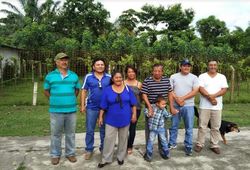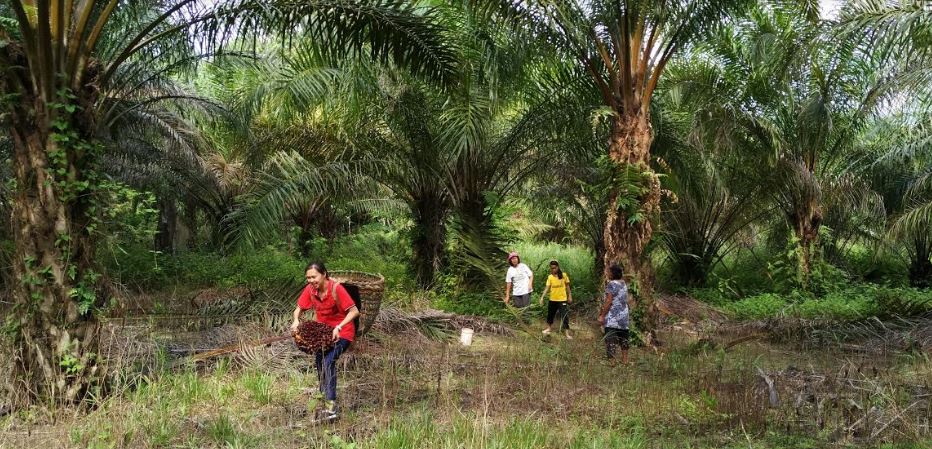Smallholders. The neglected stakeholders in producing palm oil sustainably
Smallholders are by virtue of who they are and what they do, one of the most important stakeholders in sustainability.
They are a vital part of a sustainable future as they feed not only themselves but people in cities and the global village.
In the palm oil industry, the Roundtable on Sustainable Palm Oil estimates some 3 million smallholders in the palm oil industry globally. If we assume a low figure of 2 hectares per smallholder, that places 6 million hectares of oil palm under the control of smallholders.
As an industry which some critics claim cannot be sustainable, the smallholder has a huge potential to add to the credibility of sustainable palm oil. But in the same way that they have immense potential to add to the credibility of sustainable palm oil, they also have the potential for negative impacts in terms of environmental and labor issues.
This potential for negative impact has been recognized in recent times which is why we are seeing many pledges by industrial growers and companies that use palm oil to support smallholders.
The support has consisted mostly of training and educating in better farming practices to reduce their environmental impact. This is somehow expected to improve livelihoods but fresh reports indicate that more needs to be done beyond training and education.
News reports from various palm oil producing regions including Ecuador and Malaysia clearly show that the low prices for palm oil in the past few years, is threatening their livelihoods. Beyond the failure to provide a livelihood today is the long term threat that once their farms are due for replanting, they won’t be able to replant simply due to the lack of money.
Sustainability practices that industry experts talk about is a big ask from the smallholder whose top priority is the maximization of harvests for immediate financial returns. The best suggestion from these scientists which is the intensifying of cultivation may work well for industrial plantations as a means to reduce land use for palm oil but for the small holder with their limited land availability, intensification usually means applying more fertilizers which is well known to have a negative impact on soil and water quality.
Environmental factors aside, the sustainability of the small holder cannot be reduced to a level where their mixed crop farms provide food for themselves when global commodities prices crash.
Sustainability for them must include their ability to progress along with the rest of society. An ability which can only be provided by reasonable financial returns.
If the industry wants to include small holders in the sustainability story on palm oil, support for small holders has to go beyond training and education. The key support needed will be price protection to shield the small farmer, especially the masses with two hectares or less, from the volatile commodities markets.
The help they need has to come from a minimum guaranteed price that will ensure the continuance of better farming practices after training.
The only price support for smallholders presently is with the RSPO credits but even this scheme allows the exposure of smallholders to demand and supply. No one should expect the small holder to keep paying into the fixed costs of producing sustainably when they do not know how much they’ll be getting for their efforts.
Smallholders are by virtue of who they are and what they do, one of the most important stakeholders in sustainability.
They are a vital part of a sustainable future as they feed not only themselves but people in cities and the global village.
In the palm oil industry, the Roundtable on Sustainable Palm Oil estimates some 3 million smallholders in the palm oil industry globally. If we assume a low figure of 2 hectares per smallholder, that places 6 million hectares of oil palm under the control of smallholders.
As an industry which some critics claim cannot be sustainable, the smallholder has a huge potential to add to the credibility of sustainable palm oil. But in the same way that they have immense potential to add to the credibility of sustainable palm oil, they also have the potential for negative impacts in terms of environmental and labor issues.
This potential for negative impact has been recognized in recent times which is why we are seeing many pledges by industrial growers and companies that use palm oil to support smallholders.
The support has consisted mostly of training and educating in better farming practices to reduce their environmental impact. This is somehow expected to improve livelihoods but fresh reports indicate that more needs to be done beyond training and education.
News reports from various palm oil producing regions including Ecuador and Malaysia clearly show that the low prices for palm oil in the past few years, is threatening their livelihoods. Beyond the failure to provide a livelihood today is the long term threat that once their farms are due for replanting, they won’t be able to replant simply due to the lack of money.
Sustainability practices that industry experts talk about is a big ask from the smallholder whose top priority is the maximization of harvests for immediate financial returns. The best suggestion from these scientists which is the intensifying of cultivation may work well for industrial plantations as a means to reduce land use for palm oil but for the small holder with their limited land availability, intensification usually means applying more fertilizers which is well known to have a negative impact on soil and water quality.
Environmental factors aside, the sustainability of the small holder cannot be reduced to a level where their mixed crop farms provide food for themselves when global commodities prices crash.
Sustainability for them must include their ability to progress along with the rest of society. An ability which can only be provided by reasonable financial returns.
If the industry wants to include small holders in the sustainability story on palm oil, support for small holders has to go beyond training and education. The key support needed will be price protection to shield the small farmer, especially the masses with two hectares or less, from the volatile commodities markets.
The help they need has to come from a minimum guaranteed price that will ensure the continuance of better farming practices after training.
The only price support for smallholders presently is with the RSPO credits but even this scheme allows the exposure of smallholders to demand and supply. No one should expect the small holder to keep paying into the fixed costs of producing sustainably when they do not know how much they’ll be getting for their efforts.

A great example of minimum price guarantees can be seen in Ecuador where, Organic Crops EC, guarantees their farmer partners, a minimum price for Fresh Fruit Bunches. Theirs is a beautiful example of sustainable palm oil but it is made possible only with the support of their buyers which includes Ciranda from the US.
This real life example shows that the additional costs of producing sustainable palm oil with small holders must be shared by other stakeholders especially those who are using smallholders as a feature of their sustainability claims.
This has to start with the buyers. The example of Organic Supply in Ecuador and Ciranda in the US is a good example but beyond the supply chain itself, governments, especially in the mature production countries of Malaysia and Indonesia must create financial support schemes for smallholders to ensure sustainability.
Their contribution to export revenues has financed development of these countries so in order to keep them as part of story on sustainable palm oil, the revenues they generate should be returned to them at least in the form of guaranteed pricing.
In Malaysia where the industry is so tightly monitored by the government, it should be easy enough to set aside a portion of palm oil export revenues towards a sustainability fund to protect the small holder from the global commodities market. Especially now that the Malaysian Sustainable Palm Oil scheme is being enforced across the country. It would take very little to inform the small holder that if they take good care of their farms and send in only the best fruits for maximum extraction rates that there is a sustainability rebate should they fail to make a livelihood out of it.
The long term impacts of a guaranteed price for their FFBs will bring about higher yields without expanded plantings and improved environmental values in the areas they work. Based on discussions with smallholders in Malaysia, the indication is that they are willing and able to participate in sustainability programs. It is now up to buyers and governments to show that they are also willing and able to keep smallholders as the best part of the story on sustainable palm oil.
Posted September 2018. CSPO Watch

